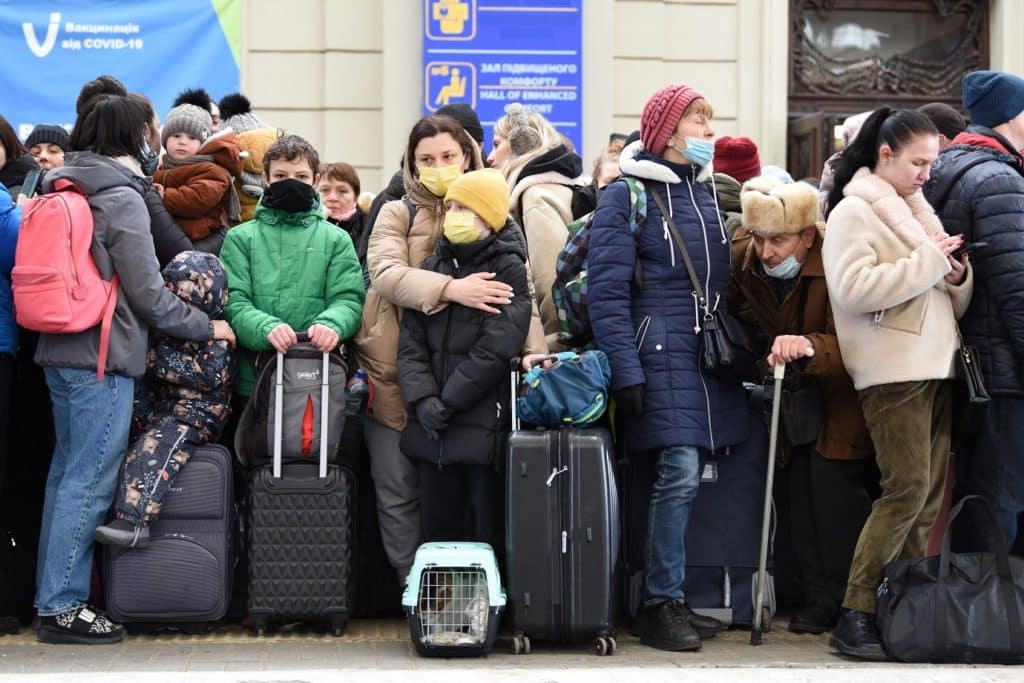Yuliya remembers the moment the war reached her home in Odessa, southern Ukraine. She remembers the deafening explosion; she remembers her daughter’s panicked cry. “Mummy, mummy the war has come,” Yuliya recalls her young daughter saying as she ran around their flat. “Everyone told you the war was coming and you did nothing. We are not safe here, we have to leave.”
Yuliya recounted this story to me when I met her during my visit to Poland recently. She said in that moment she knew her only choice was to pack up their lives into a few small suitcases and flee Ukraine. Her husband would stay behind, obligated under Ukraine’s conscription laws and because he wanted to help.
Yuliya bought train tickets to neighbouring Poland and three days later she, her daughter and son said an emotional goodbye to their father before joining the exodus of Ukrainians fleeing their homeland in search of safety. Most of them women and children.
During my trip to Poland, I was privileged to sit down with Yuliya and other Ukrainian refugee women living in the country and hear their stories. Many of them thought the war would be over by now. Some thought they would be back home within weeks. But nearly one year after the war began, the future feels more uncertain than ever for those displaced from their homes, as challenges to survival grow.
For many, their savings have diminished and they are struggling to find work while caring for children or elderly relatives. Jobs are available in Poland, but the availability of childcare remains a barrier.
Now, they are battling a harsh winter.
The refugee women I spoke with are worried about the high cost of winter, from affording heating in a rented room to buying winter clothes for their children. Winters in this part of the world are unforgiving, with temperatures dropping to below freezing in parts. Accessing heating, shelter and blankets can be the difference between life and death.
In Ukraine, continued conflict has damaged and destroyed homes and disrupted heating, electricity and livelihoods. For UNHCR, the UN Refugee Agency, winter has brought a new influx of refugees from Ukraine into Poland and other neighbouring countries.
Ninety percent of those fleeing Ukraine since the war began have been women and children, each with their own story of hardship, their own story of resilience.
On my third day in Poland, I met Natalia and her 20-year-old son Anton who has severe autism. Packing up and leaving without a minute’s notice is hard enough, let alone when your son finds change particularly difficult. But through the support of a group on Facebook, Natalia was able to get him to Poland, where they now live in a rented apartment in Krakow. UNHCR helped them with cash assistance to help pay for necessities like rent, food and electricity.
For Natalia, moving to Poland has meant Anton has been able to attend a school that meets his needs and for the first time in 20 years he’s been able to cope with being away from her.
It was these stories of hope amid hardship that I heard again and again during my trip to Poland.
The outpouring of support for Ukrainians from the international community has been nothing short of extraordinary, including in Australia where Australia for UNHCR alone has raised record amounts for UNHCR’s work helping Ukrainians.
I was privileged to witness first-hand how that money is helping people on the ground. I saw how UNHCR’s cash assistance allows Ukrainians to spend money on what they need most: food, housing, warm clothes for their children. I visited UNHCR’s transit centres where new arrivals can find everything from a warm bed to sleep in to psycho-social support and legal advice.
Yuliya was among those who received UNHCR’s support when she arrived in Poland. And it wasn’t long before she joined UNHCR to help others like her crossing the border. She now works as a Protection Officer. Despite the uncertainty of her future, of her country, of her husband’s safety, she continues to serve others every day.
When I asked her what motivates her to do this, she said this:
“When you’re alone in an unknown country, you’re afraid of everything. You are worried about what this day brings. The future is so tentative. However, the feeling of helping each other, of helping your country’s citizens, helps you to survive.”
“Thank you to everyone. We feel the support from all over the world. We feel that we may overcome this.”



